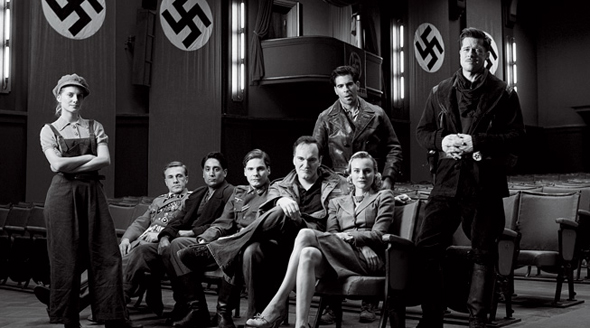Many fans of the film Inglourious Bastards are wishing Quentin Tarantino much success at the upcoming Oscars. Aside from Christoph Waltz’s most deserved Supporting Actor nomination, the award the film is best positioned for is arguably Best Original Screenplay. It is undeniable that Tarantino’s writing talents shine through the final cut of the film, but in honor of the screenplay’s nomination, we will now highlight just a few sections from the final draft of the script that did not make it into the film (warning: if you have not seen the film, this will include spoilers):
Bear Jew’s Back-story: In the film, we meet Donny “Bear Jew” Donowitz (played by Eli Roth) as he is warming up with his baseball bat in a tunnel, right before he beats a German officer to death. In the script, Donny is visible as he warms up with his bat, and then as Lt. Aldo Raine (Brad Pitt) asks him to oblige the German officer’s death wishes, he turns an smiles. Then we cut to a flashback of Donny’s life in Boston, where he works in his father’s barbershop. We then see Donny go into a sporting goods store and select the baseball bat that would become his signature Nazi-killing weapon. The final part of this sequence involves a tender scene with Donny and his neighbor, Mrs. Himmelstein, where we learn that Donny is asking people to inscribe the names of loved ones who has been lost or endangered by the war onto his bat. When Mrs. Himmelstein asks Donny if he is a real basterd (as spelt in the script), he answers he is. She repiles, “Good. A Basterds work is never done. Specially in Germany.” While this sequence was filmed, Donny’s entrance in the film had such a great build-up, that the back-story was ditched so not to ruin the momentum. Don’t be surprised if this footage ever surfaces in a prequel/sequel.
Young Shoshanna and the Cinema: Two weeks after the massacre of her family, wearing a stolen nurse’s uniform to replace her bloody clothes, Shoshanna attends a screening of a Bridget von Hammersmark film. When all of the other patrons have left, Shoshanna tells her story to Madame Mimieux, the theater owner, and asks to be taught how to operate the projectors, offering her services in exchange for shelter. Without being too comforting, Madame Mimieux agrees to give her a chance. While footage of this sequence may never surface, Tarantino has said in the past that once he writes something, it has happened, meaning that it becomes part of the character’s history, whether or not the audience ever knows about it.
Zoller as a Projectionist: In the script, just like in the film, when Frederick Zoller finds Shoshanna in the bistro, he reveals to her that he is a war hero and film star. However, in the script, Zoller also talks about his six sisters, and how they ran a family operated cinema. Later, during the Nation’s Pride premiere, he begs her to let him into the projection booth to help with a reel change, saying that he hasn’t done one in two years. So many of the heroes in this film have had film-related professions (film critic, actress, projectionist, theater owner), so it’s interesting that this attribute would be attached to a villain (sweet, but murderous) in order to make him more likeable.
Goebbels and His Films: In the restaurant scene where Zoller tries to convince Joseph Goebbels to have his premiere in Shoshanna’s cinema, Goebbels indicates that he will need to see a film in the theater before making his decision. At that point in the film, Landa enters and Goebbels leaves. However, in the script, the scene continues with Goebbels asking Shoshanna which German films she has. She replies that she has older German classics, stating that her German audience is older and is nostalgic for older times. Horrified that she does not have any of his own films, Goebbels exclaims that his is thee cinema of Europe. In the end, Zoller rescues the situation by suggesting that they watch Lucky Kids, one of Goebbels’s favorites. This scene is one of many in which Tarantino demonstrates a knowledgeable in Weimar Cinema history, as well as cinema under the Third Reich. It is even further demonstrated in the film after the screening, when Goebbels becomes upset at the mention of actress Lillian Harvey’s name (the Nazis had renounced her citizenship in 1943 after helping a Jewish friend escape the Gestapo). The extended version of the restaurant scene can be seen on the DVD.
Donny’s Alternative Ending: Rather than the Scarface-like annihilation we see in the film, where the Donny and Omar open fire over the film’s audience, Donny’s last stand in the script takes place in the bathroom while preparing for his surprise attack on Hitler. After a long conversation of fake Italian with Hirschberg (many of Hirschberg’s lines and scenes are done by Omar in the film), Donny comes face to face with a German soldier bearing the mark of Aldo’s swastika on his forehead. In a last minute moment of recognition, each man empties his gun into the other until they fall dead. The Germans in the theater are then killed when the bomb that Landa had placed under Hitler’s seat goes off. While this would have been an interesting showdown, utilizing POV camera angles, the film version is a grander finale.
One can also download the entire screenplay here thanks to the Weinstein Company.


